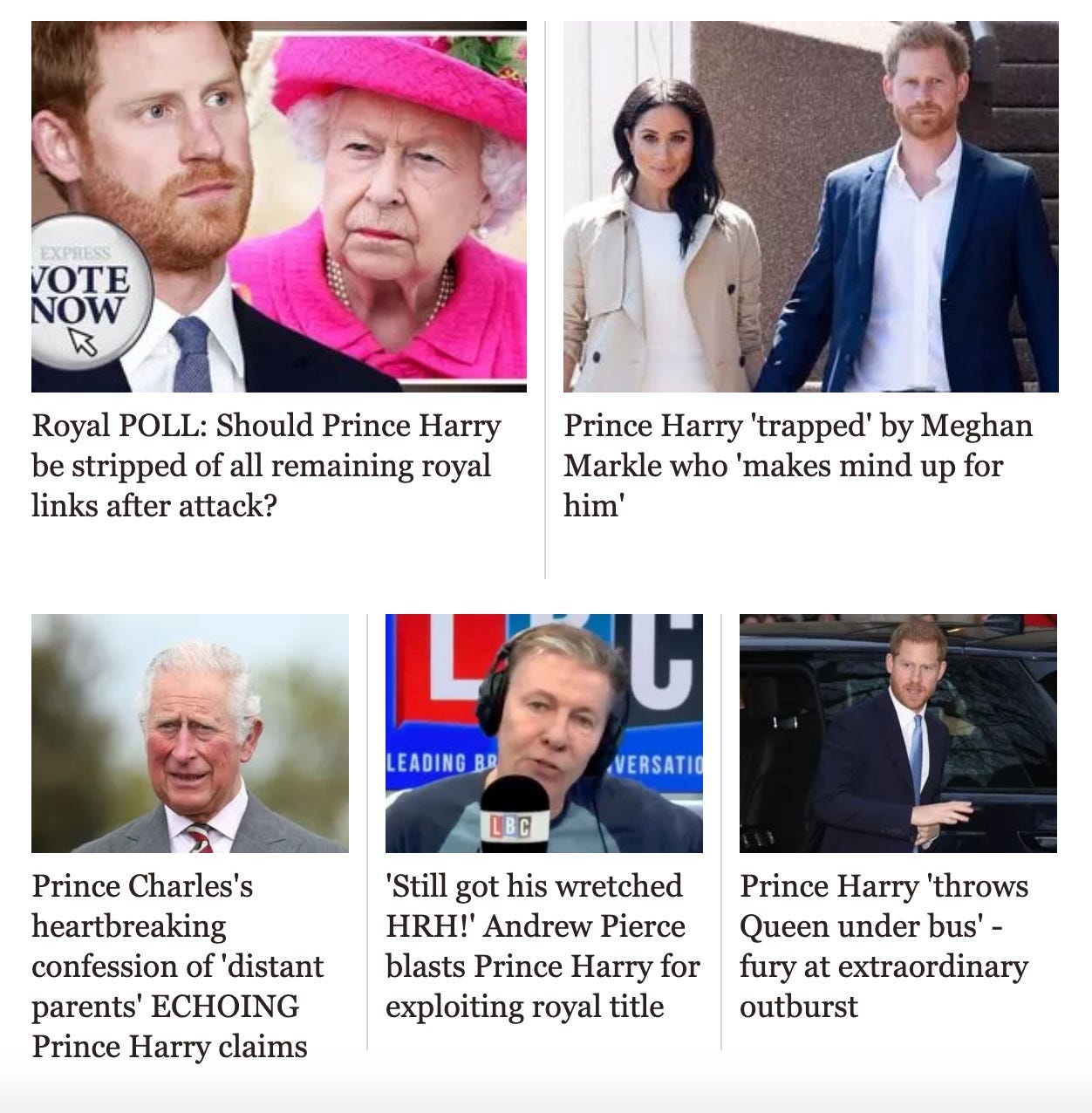Prince Harry, The Press, and Men's Mental Health
On mental health awareness week, why are the press attacking Harry for speaking out about his mental health?
It’s Mental Health Awareness Week, and the British tabloids have decided to spend it attacking a man who is speaking out about how they damaged his mental health.
You’d think as professional communicators they’d have the PR nous to know this was a bad look but, so powerful is Harry’s condemnation of them, they can’t help but go full death throe.
Harry’s May 13 appearance on actor Dax Shepherd’s podcast Armchair Expert has been framed by tabloids as “blasting the royals”, “bitter”, and “low”.
The usual suspects (Sun/Mail/Express) have put their familiar rabidity to work defining Harry’s speaking out about his life as a royal, in particular its effects on his mental health, as ‘manipulation by Meghan’ or the apparent crime of ‘insulting/breaching the trust of the royal family’ (something the tabloids would never do, and are definitely not doing literally right now).


Simply, Harry has called out the tabloids more publicly and clearly than ever. As an insider of key areas of British imperial nationhood — the royal family, celebrity, the army, the public school system etc. — Harry has powerful insights into how UK power works, and he’s saying them out loud, often. As media critic Mic Wright said in his newsletter this morning:
“In the most privileged professional wrestling ever, Prince Harry has broken kayfabe.”
The reason the tabloids are so desperate to push a narrative of Harry as ‘royal family-blasting’ is because he is actually tabloid-blasting in defence of his family.
Listen to the podcast and you’ll hear him discussing the way the royals’ relationship with the tabloids, among other traditions, has harmed them. His family has long been part of a “business model”:
“It’s the job, right? Grin and bear it. Get on with it. I was in my early twenties and I was thinking, ‘I don’t want this job. I don’t want to be here. I don’t want to be doing this. Look what it did to my mum. How am I ever going to settle down and have a wife and family, when I know it’s going to happen again?’ I’ve seen behind the curtain, I’ve seen the business model, and seen how this whole thing works and I don’t want to be a part of this.”
Harry speaks eloquently, confidently, and convincingly about the toxicity of the tabloid machine, not only where he is concerned but for countless private and public citizens. And this is not limited to the damage of the initial coverage (coverage being a respectable euphemism for lying, hounding, invasions of privacy, doxxing, etc.) but also in its subsequent silencing effect:
“I used to be fearful of it. Now, it’s almost like the same groups of people that come at it so negatively or try to turn it against you or weaponise it, and therefore prevent so many millions of people from doing so, actually encourages me to speak out more… I’m going to be vulnerable, if I get attacked for it, let’s see who’s actually attacking me and what’s their story? What’s their agenda? Who do they work for?”
The tabloid press thrives on battering and demeaning people. As the cynicism of the below cartoon shows, as soon as somebody takes control of their own coverage and narrative, they are further battered for doing so:
Ultimately, in speaking out about press abuse, Harry is doing important work. But in speaking out about men’s mental health, he’s doing desperately necessary, urgent and crucial work that’s likely life-saving.
This week I rewatched The Work, one of the most remarkable documentaries I have ever seen (and I don’t say that lightly.) There is plenty to say about the skill of putting such a film together without disrupting The Work itself, but that’s another article. What I felt particularly keenly this week was how clearly the film demonstrates masculinity in crisis and how it is beginning to be healed - so many men, from the life-serving gang member, to the frat bro, to the meek guy whose Dad didn’t let him help out on the car when he was a kid, have been pummelled into emotional detachment and isolation.
It breeds rage and damage. Damage that, as one of the facilitators says in the film, comes out “sideways” in all areas of life, particularly at the people in your life, spreading exponentially.
As a primary body of communication, the press has a huge impact on public health—mental and physical—and this same emotional detachment, particularly in tabloid reporting, is crystal clear. (Papers are run by people, after all.)
Occasionally, when they do show some semblance of empathy, it’s to pull on heart strings in order to sell more papers, rather than an attempt to actually examine a situation responsibly and with heart.
This fakery is exemplified by the Express’ approach yesterday: create a cover that appears to empathise…
…but also run numerous meritless stories that slam Harry (and Meghan, of course) personally. They also wrote a handful of pieces that appeared positive, but these equally reactionary pieces were buried among countless negative takes.
It’s celebrity gossip, pure and simple.
Harry is a harbinger for change like many others—he just happens to be a very unique one, given his rogue use of fame and power. Not only change in how the press works (and potentially, though he has not been a proponent of this, the capitalist system that has molded it) but also of a national view of the monarchy, both their public and private roles. And crucially, of the role of societal structures in dictating mental health and a certain type of ‘correct’ (toxic) masculinity.
People are working to create healthier structures in place of these, and right-wing reactionaries are flipping out. Those who deride these changes as ‘woke’ etc. have something—money, power, their identity—to protect. Those of us who seek these changes are building a healthier more equitable society for even those reactionaries to better understand who they are.









Really enjoyed reading this, and Harry is the only Royal I'm interested in hearing from at the moment. Also thank you for reminding me to watch The Work!
Another great piece, Liz. Thanks for sharing. I want to see The Work now too.